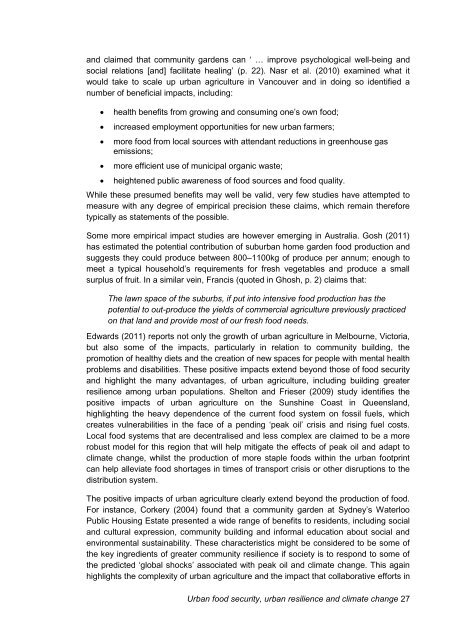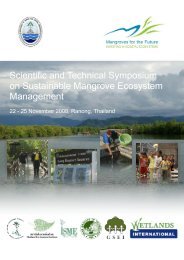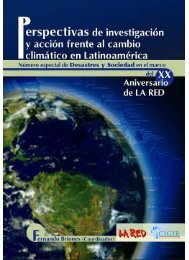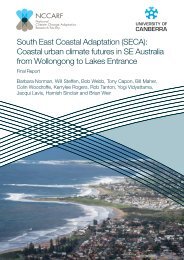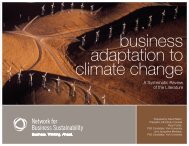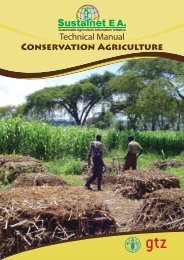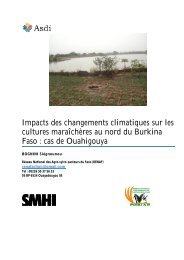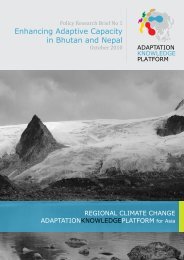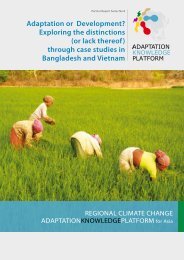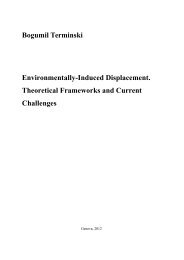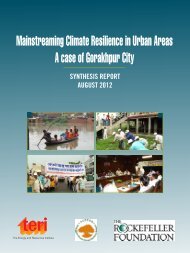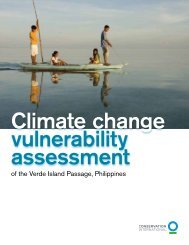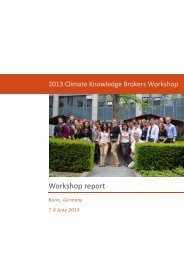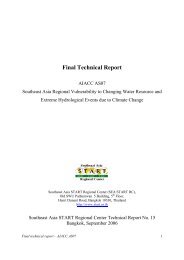<strong>and</strong> claimed that community gardens can ‘ … improve psychological well-being <strong>and</strong>social relations [<strong>and</strong>] facilitate healing’ (p. 22). Nasr et al. (2010) examined what itwould take to scale up <strong>urban</strong> agriculture in Vancouver <strong>and</strong> in doing so identified anumber of beneficial impacts, including:health benefits from growing <strong>and</strong> consuming one’s own <strong>food</strong>;increased employment opportunities for new <strong>urban</strong> farmers;more <strong>food</strong> from local sources with attendant reductions in greenhouse gasemissions;more efficient use of municipal organic waste;heightened public awareness of <strong>food</strong> sources <strong>and</strong> <strong>food</strong> quality.While these presumed benefits may well be valid, very few studies have attempted tomeasure with any degree of empirical precision these claims, which remain thereforetypically as statements of the possible.Some more empirical impact studies are however emerging in Australia. Gosh (2011)has estimated the potential contribution of sub<strong>urban</strong> home garden <strong>food</strong> production <strong>and</strong>suggests they could produce between 800–1100kg of produce per annum; enough tomeet a typical household’s requirements for fresh vegetables <strong>and</strong> produce a smallsurplus of fruit. In a similar vein, Francis (quoted in Ghosh, p. 2) claims that:The lawn space of the suburbs, if put into intensive <strong>food</strong> production has thepotential to out-produce the yields of commercial agriculture previously practicedon that l<strong>and</strong> <strong>and</strong> provide most of our fresh <strong>food</strong> needs.Edwards (2011) reports not only the growth of <strong>urban</strong> agriculture in Melbourne, Victoria,but also some of the impacts, particularly in relation to community building, thepromotion of healthy diets <strong>and</strong> the creation of new spaces for people with mental healthproblems <strong>and</strong> disabilities. These positive impacts extend beyond those of <strong>food</strong> <strong>security</strong><strong>and</strong> highlight the many advantages, of <strong>urban</strong> agriculture, including building greater<strong>resilience</strong> among <strong>urban</strong> populations. Shelton <strong>and</strong> Frieser (2009) study identifies thepositive impacts of <strong>urban</strong> agriculture on the Sunshine Coast in Queensl<strong>and</strong>,highlighting the heavy dependence of the current <strong>food</strong> system on fossil fuels, whichcreates vulnerabilities in the face of a pending ‘peak oil’ crisis <strong>and</strong> rising fuel costs.Local <strong>food</strong> systems that are decentralised <strong>and</strong> less complex are claimed to be a morerobust model for this region that will help mitigate the effects of peak oil <strong>and</strong> adapt to<strong>climate</strong> <strong>change</strong>, whilst the production of more staple <strong>food</strong>s within the <strong>urban</strong> footprintcan help alleviate <strong>food</strong> shortages in times of transport crisis or other disruptions to thedistribution system.The positive impacts of <strong>urban</strong> agriculture clearly extend beyond the production of <strong>food</strong>.For instance, Corkery (2004) found that a community garden at Sydney’s WaterlooPublic Housing Estate presented a wide range of benefits to residents, including social<strong>and</strong> cultural expression, community building <strong>and</strong> informal education about social <strong>and</strong>environmental sustainability. These characteristics might be considered to be some ofthe key ingredients of greater community <strong>resilience</strong> if society is to respond to some ofthe predicted ‘global shocks’ associated with peak oil <strong>and</strong> <strong>climate</strong> <strong>change</strong>. This againhighlights the complexity of <strong>urban</strong> agriculture <strong>and</strong> the impact that collaborative efforts in<strong>Urban</strong> <strong>food</strong> <strong>security</strong>, <strong>urban</strong> <strong>resilience</strong> <strong>and</strong> <strong>climate</strong> <strong>change</strong> 27
community <strong>food</strong> growing can have on society <strong>and</strong> the environment in addition to thecalorific <strong>and</strong> nutritional benefits obtained from locally-grown <strong>food</strong>.4.1.6 What are the barriers to the more widespread adoption of <strong>urban</strong>agriculture in Australian cities?Little now happens in cities of the developed world, including Australian cities, that isnot subject in some way to regulation by the institutions of government or by legislation.Buildings cannot be erected, l<strong>and</strong> uses <strong>change</strong>d, commercial activities undertaken,social activities carried out on public l<strong>and</strong> without obtaining the requisite permit,approval or licence. Moreover, if the necessary approval has not been granted (<strong>and</strong>sometimes even if it has), the relevant authority will often be contacted by a disgruntledcitizen concerned with nuisance from ‘inappropriate’ activities.When Australian cities grew in the 19th century the rights of property owners – takenfor granted; included the right to cultivate their own property, <strong>and</strong> to keep anassortment of animals for <strong>food</strong>. Since then a range of concerns, primarily about publichealth, neighbourliness <strong>and</strong> local amenity have presaged the introduction of a complexweb of regulations that limit the scope <strong>and</strong> practices of <strong>urban</strong> agriculture.Proposals to relax local regulations covering the keeping of chickens <strong>and</strong> other animalson properties in the city of the Gold Coast were met with somewhat predicableresponses which illustrate the persistence of debates about the proper place of ‘rural’activities in <strong>urban</strong> areas. The Chair of the Cultural <strong>and</strong> Community DevelopmentCommittee of Gold Coast City Council was quoted as saying:Would you like to live next door to someone who’s got chickens clucking aroundplus the potential smell <strong>and</strong> everything else that comes with it...It’s not like a pet,a companion like a cat or a dog, <strong>and</strong> I think if you want to do that, suburbia is notthe place for that, I really don’t think it is, so I totally disagree with it. (Gold CoastBulletin, 2 March 2010, accessed online 16 October 2012:http://www.goldcoast.qld.gov.au/council/cr-robert-la-castra-768.html).A similar proposal two years later to allow small farm animals such as pigs <strong>and</strong> goatson lots of less than 2000m 2 drew the following response from the same councillor:‘Do we want to turn the city into a third world country? We’ll turn the city into azoo. We have zoning for a reason.(Gold Coast Bulletin, 21 August 2012, accessed online 16 October 2012,http://www.goldcoast.com.au/article/2012/08/21/437011_gold-coast-news.html)Thus, a somewhat abstract belief that cities (including their suburbs) are no place forchickens, results in a specific local law that proscribes the minimum lot size if one is tokeep chickens, pigs or other ‘farm’ animals.While the regulations driven by public health concerns are typically implemented <strong>and</strong>enforced by local government officials, probably the most influential regulators of <strong>urban</strong>agriculture have been planners (whether called <strong>urban</strong> planners, town planners,environmental planners or city planners). Of course, debates about the relationshipbetween planning <strong>and</strong> <strong>food</strong> <strong>security</strong> are not new. Peter Self’s influential book, Cities inFlood (1957) devoted a chapter to ‘<strong>food</strong> versus homes’ <strong>and</strong> to a critique of British<strong>Urban</strong> <strong>food</strong> <strong>security</strong>, <strong>urban</strong> <strong>resilience</strong> <strong>and</strong> <strong>climate</strong> <strong>change</strong> 28
- Page 1 and 2: Synthesis and Integrative ResearchF
- Page 3 and 4: Published by the National Climate C
- Page 5 and 6: ABSTRACTFood security is increasing
- Page 7 and 8: 1. a review of the literature: on n
- Page 9 and 10: its Food for All project. This help
- Page 13 and 14: In response to the existential thre
- Page 15 and 16: 2. OBJECTIVES OF THE RESEARCHFood i
- Page 17 and 18: debates and to the more systematic
- Page 19 and 20: organisation in the past few years.
- Page 21 and 22: 4. RESULTSIn this section we presen
- Page 23 and 24: increasing productivity. Thus, whil
- Page 25 and 26: people and the origins of their foo
- Page 27 and 28: urban food supply chains. Thus, whi
- Page 29 and 30: This logistics system is dominated
- Page 31 and 32: Like Hodgson et al., as per definit
- Page 33 and 34: esilient, powerful by being locally
- Page 35: volume or even its contribution to
- Page 40 and 41: generations this history has been f
- Page 42 and 43: a stronger focus on addressing the
- Page 44 and 45: The third key aspect is fairness -
- Page 46 and 47: climate (which we live and work in
- Page 48 and 49: agriculture. Eight percent is in ur
- Page 50 and 51: This concept of the ‘spaces in be
- Page 52 and 53: esearch scientist and chair of the
- Page 54 and 55: As discussed above, protection of t
- Page 56: 4.2.5 What is the extent and the im
- Page 60 and 61: no place under the panoply of pract
- Page 62 and 63: increased, the market dominance of
- Page 64 and 65: … the residents of S Park called
- Page 66 and 67: 5. CONCLUSIONSThere is growing conc
- Page 68 and 69: urban resilience. This inevitably c
- Page 70 and 71: In many respects these contrasting
- Page 72 and 73: Many interviewees of both standpoin
- Page 74 and 75: a given area. The rationale for thi
- Page 76 and 77: mapping the location of sources of
- Page 78 and 79: Australian food policy debates refl
- Page 80 and 81: APPENDIX 1: URBAN FOOD SECURITY, UR
- Page 82 and 83: IntroductionGlobally, and in Austra
- Page 84 and 85: Review methodsThis stage of the res
- Page 86 and 87:
despite many of the causes of food
- Page 88 and 89:
…by 2050… food production will
- Page 90 and 91:
2. How is food security (in general
- Page 92 and 93:
the food security of cities, but no
- Page 94 and 95:
While some see the density of devel
- Page 96 and 97:
when suppliers, distributors, and c
- Page 98 and 99:
a more prominent role in enhancing
- Page 100 and 101:
community gardens webpage on the Co
- Page 102 and 103:
comprehensive description of the ca
- Page 104 and 105:
In both the developed and developin
- Page 106 and 107:
Their review notes a significant in
- Page 108 and 109:
lines of supply from often rural pl
- Page 110 and 111:
1 IntroductionCities have always be
- Page 112 and 113:
Despite some attempts to curb urban
- Page 114 and 115:
the Gold Coast remains a city that
- Page 116 and 117:
ackyard/community gardenernot affil
- Page 118 and 119:
level in local government. VicHealt
- Page 120:
Figure 2: Impacts on Municipal Food
- Page 125 and 126:
security I recognise that the cost
- Page 127 and 128:
United States, he offered the follo
- Page 129 and 130:
This vision highlights the multi-fu
- Page 131 and 132:
An environmental education centre.
- Page 133 and 134:
Melbourne Food ForestA Melbourne ga
- Page 135 and 136:
stakeholder consultations, the repo
- Page 137 and 138:
can. We sense the changes. The earl
- Page 139 and 140:
half-desert environments. We’re g
- Page 141 and 142:
etain its basic function and struct
- Page 143 and 144:
government; and that trying to get
- Page 145 and 146:
the north and the west, where it wo
- Page 147 and 148:
Why do people buy so much food that
- Page 149 and 150:
urban agriculture (however broadly
- Page 151 and 152:
enefits and risks. Before we can co
- Page 153 and 154:
Another important and tangible role
- Page 155 and 156:
coast without any problems whatsoev
- Page 157 and 158:
BIBLIOGRAPHYAECOM (2011) Scoping St
- Page 159 and 160:
Burns, C. I., A. (2007). Measuring
- Page 161 and 162:
Edwards, F., & Mercer, D. (2010). M
- Page 163 and 164:
James, S. O’Neill, P. and Dimeski
- Page 165 and 166:
Millar, R., 2012, ‘Government shi
- Page 167 and 168:
Saltmarsh, N. M., J; Longhurst, N.
- Page 169 and 170:
Walker B., 2008, Resilience Thinkin


